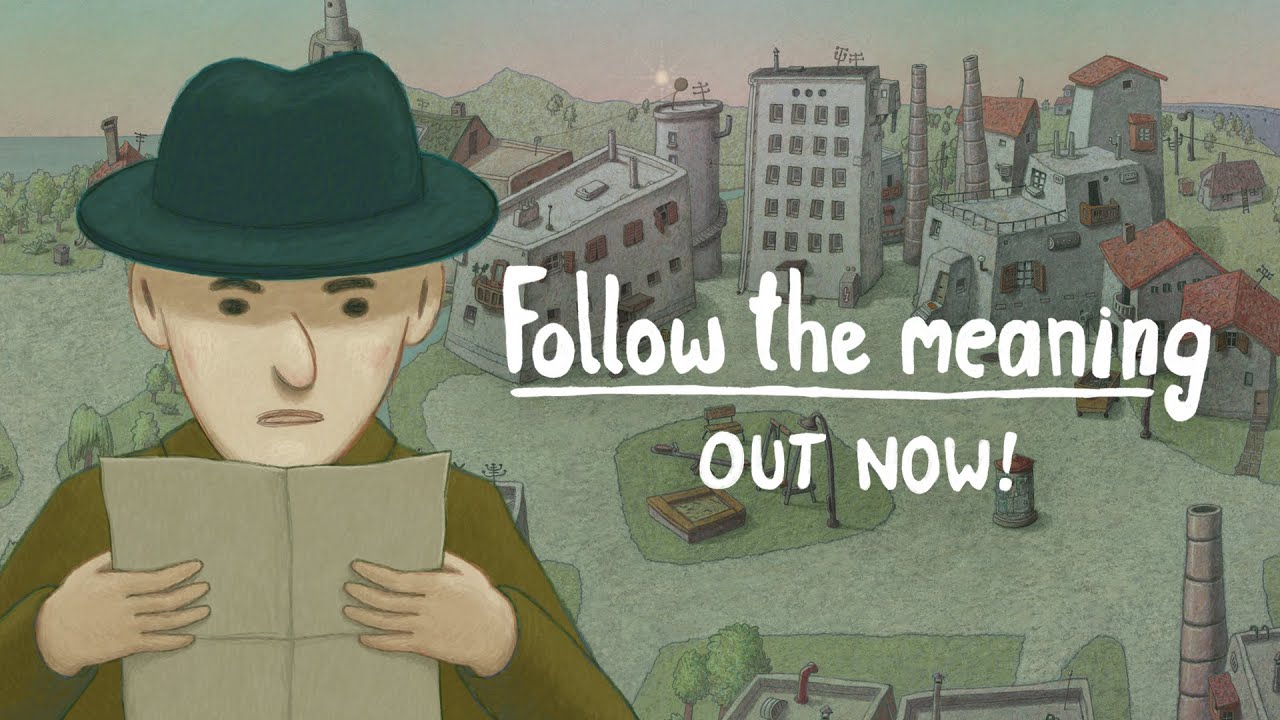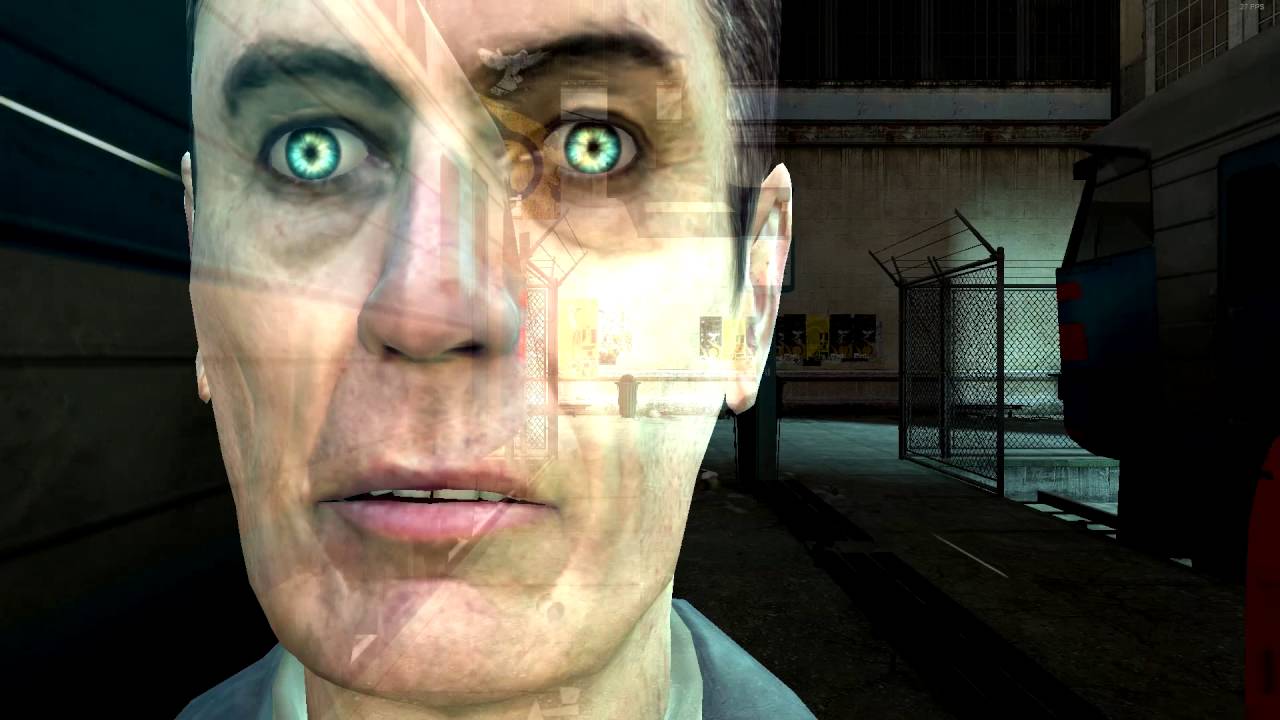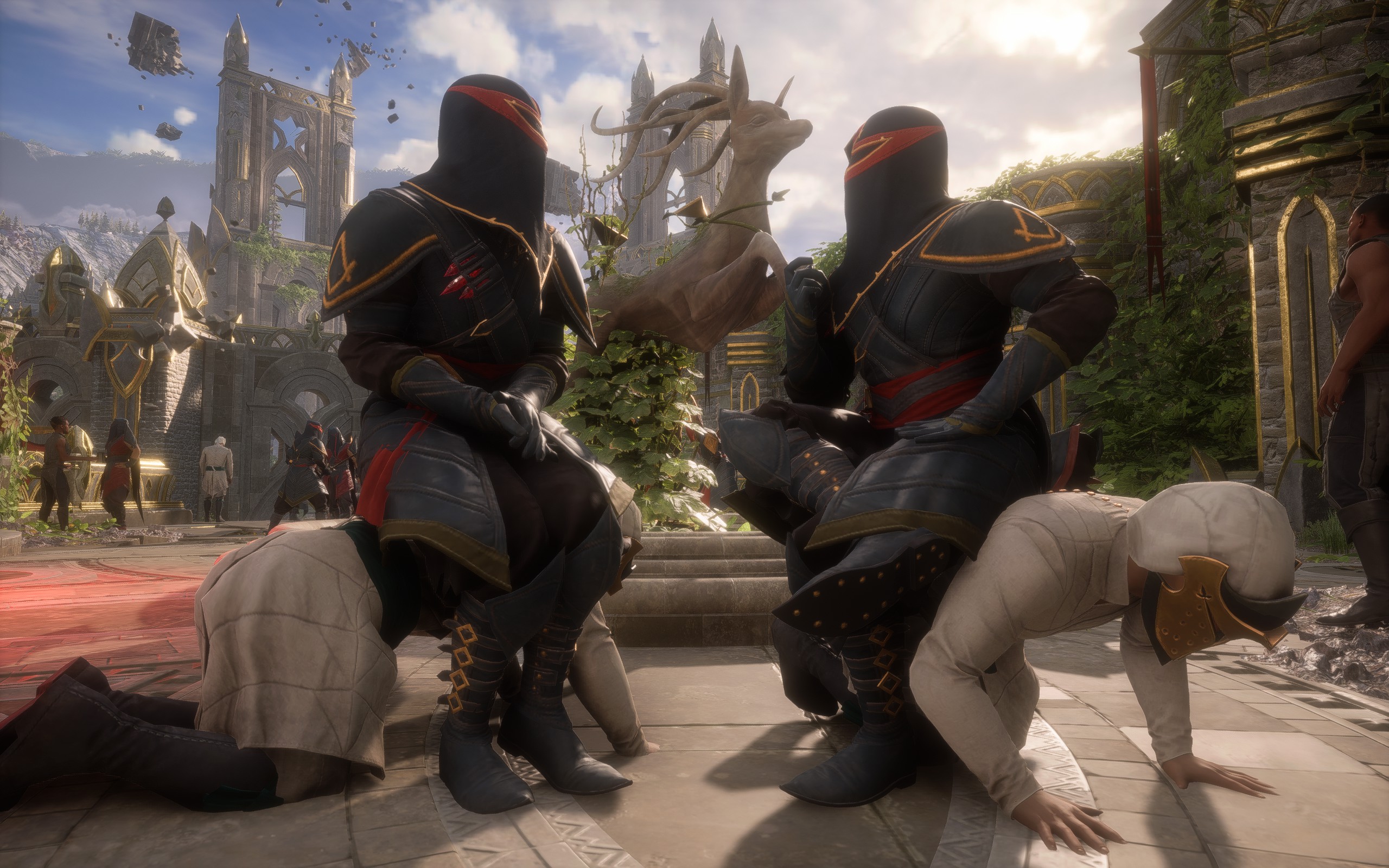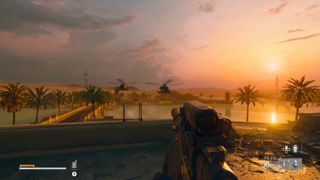
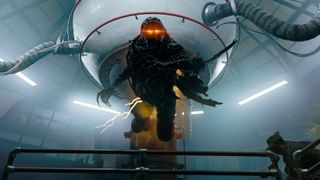
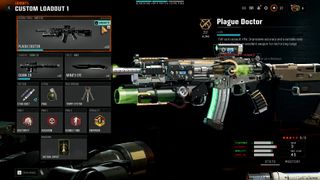
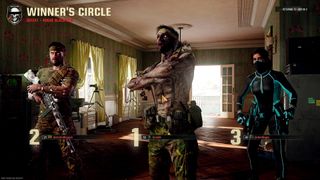
At some point when I wasn’t watching, Call of Duty’s campaign became a bad stealth game. Gone are the perspectives of the faceless and unknown soldiers and the grinding attrition of frontline warfare, replaced with characters who look and feel like they came from a Netflix Original movie chasing guys in polo shirts down European alleyways. When Black Ops 6’s campaign occasionally channels the bombastic scope of its predecessors, it rocks, but all too often it’s bogged down in tedious espionage.
NEED TO KNOW
What is it? This year’s Call of Duty, set in the 1990s.
Expect to pay $70
Developer Treyarch, Raven Software
Publisher Activision Blizzard
Reviewed on Radeon RX 6600, Ryzen 7 5700G, 32GB DDR4 RAM
Steam Deck Not verified
Link Official site
I’m usually the CoD fan that actually cares a lot about the campaign, but it’s those shortcomings pushing me towards this year’s stellar multiplayer offerings. Black Ops 6 has lightning fast gunfights that leverage a wonderfully weighty new movement system to give old and new modes alike a distinct, John Woo-esque flair, where every match evokes the climactic shootout from Hard-Boiled – and what’s more 90’s than that?
“I was there, and it sucked.”
Black Ops 6 begins with an op gone wrong at the height of Desert Storm, with heel Russel Adler returning to prevent your high value target from falling into the hands of a compromised CIA. Unknowns at the highest level of government are funding a literal black ops paramilitary outfit formed from ex-Eastern bloc soldiers operating under the name “Pantheon,” siccing them on your squad at every turn. Pantheon’s goons are occasionally bolstered by elite operatives, awkward miniboss encounters plucked from Warzone maps that prompt some of Black Ops 6’s corniest moments. It’s really funny to be gouging out some Cold War psycho’s eyes in an interactive cutscene moments before getting into a Borderlands-esque shootout with an armored guy who can withstand 27 headshots as he sprints around the room tossing out glowing electric bear-traps, or being ambushed by a hazmat suit-wearing operative who leaves Joker gas in his wake while doing Dark Souls dodge rolls.
You’ll encounter none of the cinematic expertise that characterized Black Ops 1 or World at War in this campaign.
Raiding Saddam’s palace in search of WMDs (yes, really) and then slinging surface-to-air missiles at graduates of the John Landis Helicopter Academy was the only real moment of “hell yeah” I found in the campaign, a gleefully stupid setpiece that had me grinning from ear to ear. Unfortunately, that level is a one-and-done conclusion to an abysmal mini-open world mission that has you hitting Iraqi SCUD launchers, an underwhelming sampling of Warzone’s DMZ mode that scrapes at the shadows of Metal Gear Solid 5.
Unlike Metal Gear, Black Ops 6 tends to keep history at arm’s length. Marketing materials often cited the global conflicts that followed in the wake of the Soviet Union’s collapse, but few of those are represented here in earnest. The Gulf War is almost entirely inconsequential to the narrative, which instead focuses on the dark dealings of fictional private military companies, rogue operatives, and organized crime.
Treyarch’s pedigree for grimdark renderings of historical and modern conflict is wasted, and you’ll encounter none of the cinematic expertise that characterized Black Ops 1 or World at War in this campaign—nothing so inspired as rolling up the Mekong Delta blasting “Sympathy for the Devil”, nothing like the Battle of Berlin, no revelation as effective as your faceless soldier being part of a pivotal moment in history a la World at War’s mind-bendingly good Reichstag raid. At its most inspired, we’re attending a Bill Clinton campaign fundraiser and pulling off Payday 2 casino heists on European mobsters.
For all of Black Ops 6 pomp and circumstance, it’s campaign that feels less evocative of the 1990s than, say, Ace Combat Zero on the PlayStation 2, a game where you’re stuck within an airplane cockpit the whole time.
Squandered potential
One late-game mission, a dollar store Bioshock riff, integrates the zombies mode into the campaign in such an egregiously stupid and out-of-place way that I was aghast. Singleplayer zombies has always been an exercise in tedium, and having this extended fan-service level replete with repetitive boss encounters and nonsensical environments in an already mediocre campaign was beyond exhausting. If you’re heavily invested in Call of Duty’s “lore,” (which back in my day we called “history”), this might be an extremely gratifying trip down memory lane, but I was begging for it to be over a quarter of the way through.
As a ’90s industrial fan and noted junglist, I was also hugely disappointed at just how much Black Ops 6 squanders both its setting and licensed soundtrack, never putting it to use in a way that feels inspired, never accenting the period-piece action or providing thematic juxtaposition. While I guess I’m relieved that my prediction that we would be setting the Kuwait Oil Fields aflame to The Prodigy’s “Firestarter” didn’t come true, I’m now kind of wishing it did. Only when the occasional touch of acid synths gave a ’90s EDM flair to the action did my raver heart flutter.
I don’t accept that the largest game franchise on the planet, especially with such a rich history of incredible singleplayer campaigns, should be so thoroughly mediocre. Call of Duty used to at least have an engaging perspective, putting you in the hot seat of the turning point battles of the near-modern world, but Black Ops 6 offers nothing in this regard.
One mission towards the end of the story, “Ground Control,” is based around an encroaching coalition tank line encircling an airport held by Iraqi soldiers. The way this tank line is framed invites obvious comparison to Call of Duty 4’s still jaw-dropping “Shock and Awe” mission, a dread-inducing spearhead assault where imperial hubris is punished with nuclear force. Ground Control, like so much of Black Ops 6’s campaign, flaunts its moments of militaristic might like eye candy—fleeting thrills, mostly experienced through cutscene rather than control, serving as noise to cover the smaller, less interesting “shadow operation” story beats you actually get to play. There’s no rule that says Call of Duty has to have huge setpieces, but the lack of them is sorely felt in this story, and the instantly forgettable spy thriller that’s replaced them feels like a bad trade.
Bullet ballets
For all my gripes about the campaign, my annoyance melts away in the face of the multiplayer, where Black Ops 6 seriously delivers. Call of Duty has never felt better in the hands, owing largely to the new omnimovement system, which lets one sprint, slide, and dive in any direction. It’s a major reason why Black Ops 6 feels so good to play, bringing a satisfying sense of weight and momentum to a series that spent the last decade teeter-tottering between boots-on-the-ground and full-on jetpacks.
Vanquish-style knee slides chain together smoothly, and side diving into a room while mag dumping an SMG a la Max Payne just feels damn good. It’s a mechanic I’ve been making extensive use of, and to surprisingly great effect. The real utility of the twitchy slides and dives is that they drastically lower the aim assist of whoever is targeting you, allowing you to skate past bursts of bullets and accurately return fire. I’ve been routinely placing top three in each match, which I’m still kind of shocked by. I suffer from a subset of cerebral palsy which has significantly atrophied one of my aiming hands into a limp claw-thing—an appropriate indicator for how vital smart movement is this go-round. Black Ops 6 is unexpectedly comfortable and empowering in the hands for a genre that is all too often a painful struggle for me.
Vanquish-style knee slides chain together smoothly, and side diving into a room while mag dumping an SMG a la Max Payne just feels damn good.
I’ve been generally pleased with the maps this year as well, which have become a point of consternation among players: Babylon is a frantic Shipment-like, the kind of close quarters meat grinder that massages your brain into a TikTok scrolling-esque trance. Derelict, a narrow and linear blasting pit that can quickly see you flanked on all sides, is an absolute joy to dive and slide through. Vorkuta’s long pathways are interspersed with sporadic cover and breakaway junctions that provide ample opportunities for fake-outs and clever flanks when you commit to using omnimovement in earnest. The only duds are Rewind, an American strip mall nailed by a cruise missile with some overly punishing open spaces, and Vault, an island outpost subject to egregiously bad spawns.
I’ve also fallen head-over-heels for Kill Order, a spin on Black Ops – Cold War’s VIP mode which randomly selects high value targets on both teams and grants them armor, Last Stand, and a persistent UAV. The goal is to rack up a higher HVT killcount than the other team, and each match consistently led to some of the most engaging and dynamic firefights I’ve had in multiplayer Call of Duty—constantly trying to get the edge over a better-equipped foe who always knows where you’re coming from. New modes in Call of Duty have a habit of falling into instant obscurity as most players prefer the familiar doldrums of TDM and Domination, but this one is quite good and I don’t see myself removing Kill Order from my rotation anytime soon.
Gunplay is in line with the standard set by the Modern Warfare reboot series, owing to the stellar foundations offered by Infinity Ward’s engine. This is the first time that all three of Call of Duty’s major development arms are technologically unified, and it does wonders for consistency. A lot of the weapons here feel like the platonic ideal of a videogame gun, with a few standouts—the AK-47 spits bullets better than it ever has, its characteristic punchy recoil and ever-reliable irons making it a general purpose icon. Another low-level favorite is the Tanto .22, a weirdly slow Soviet SMG that spits out low-caliber, high damage rifle rounds. It’s an easy-to-handle mid-range monster with an ASMR-like ka-chunk to its action.
I also quickly fell in love with the Tsarkov 762, a wonky close-quarters rifle that evokes the halcyon days of Halo: Reach’s DMR. Taken altogether, though the selection and their attachments don’t really evoke the 1990s, the arsenal provided here is more characterful and fun than any Call of Duty in recent memory.
Visual slurry
One of my biggest issues with Black Ops 6 is progression, and how intertwined multiplayer and the zombies mode is. Zombies has never been my first choice for CoD, but I respect just how far Treyarch has pushed it: this is undoubtedly zombies at its peak, with massively expanded mechanics, a new bestiarium of boss monsters, and extraction mechanics that let you bail out on a run early. It’s also an ungodly garish headache—it’s the “clown show of hideous skins” we’ve come to expect from live service games, except now with no countdown. Black Ops 6 hit the ground running with gaudy promotional operators (namely the terrible “Zombie Woods” pre-order bonus) and demonically infused Nerf gun skins. Is it too much to ask that a game launch and stick to a semi-consistent visual style for maybe six weeks?
Brand slurry aside, omnimovement significantly improves the experience of playing keep away with hordes of zombies, especially considering just how much of this mode is based around walking backwards and sprinting.
I tend to get out of Call of Duty what I put into it. After a stressful shift at my day job, and once I get my ’90s techno playlist going, my broader issues with campaign structure, an already compromised aesthetic, and a hell of a lot of wasted potential, ultimately feel like nitpicks of what is an unquestionably good year for Call of Duty. Though my heart may yearn for a bygone campaign era, one that was more ambitious, thoughtful, and considered, Black Ops 6 just feels too good to put down.

